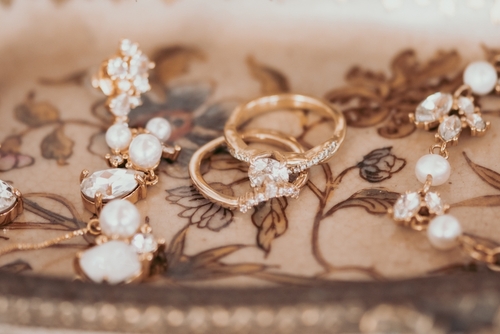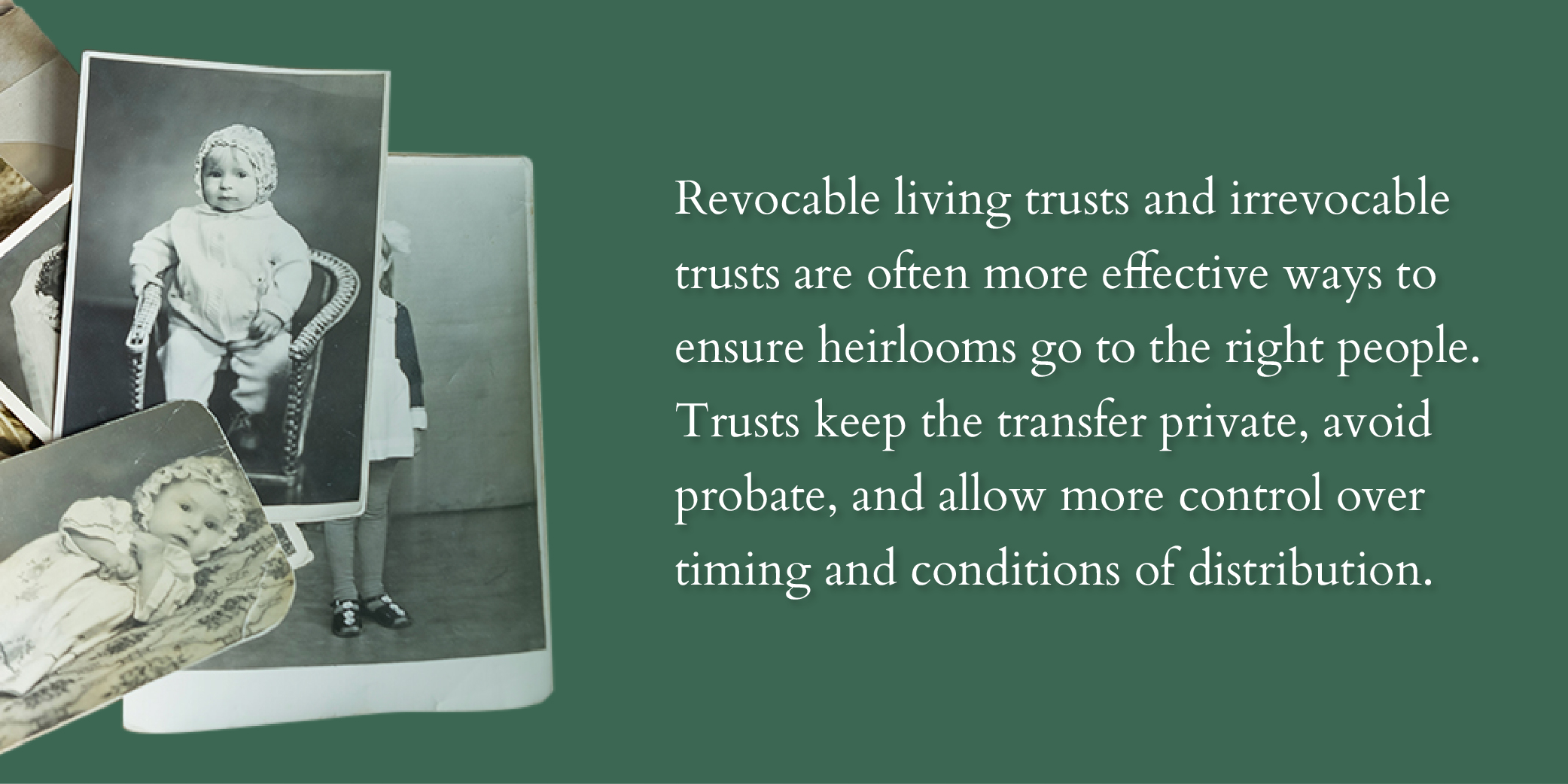How Can I Ensure Heirlooms Pass to the Right Person?

Passing down heirlooms is often about more than monetary value. Whether it is a grandfather’s watch, a portrait that has hung in the family home for generations, or a set of china brought over from the old country, these items carry emotional and cultural weight. In high-net-worth families, those heirlooms often sit alongside substantial financial and business assets, and failure to plan carefully can spark long-term family disputes, litigation, and unnecessary loss.
If you are part of a family with significant assets you want to protect, ensuring your heirlooms end up in the right hands requires more than a will. It takes intentional estate planning, clear communication, and legal mechanisms that align with your overall wealth transfer strategy – all things our Naperville, IL estate planning lawyer can help with.
Why Do Disputes Over Heirlooms Happen?
Even in laid-back families, conflicts can emerge when a parent or grandparent dies and the distribution of sentimental assets feels unfair or unclear. This can be magnified in families of wealth, where heirlooms may have not only sentimental but also historic, artistic, or collectible value.
Here are a few common reasons disputes over heirlooms arise:
- The estate plan is vague or silent about personal property.
- One heir believes they were promised a specific item verbally.
- Multiple heirs want the same object for different reasons, such as personal connection, financial value, or perceived fairness.
- The executor must make decisions based on unclear documents or missing instructions.
- A second marriage or blended family causes conflict over what is “fair.”
These conflicts are not just theoretical. They can cost families tens of thousands of dollars in litigation and leave emotional scars that persist for years.
Should You Include Heirlooms in Your Will?
While it is common to list valuable personal property in a will, doing so is not always sufficient. Wills become public during probate, and they can be challenged. They also only take effect at death and may not fully account for changes in relationships, the value of items, or your wishes.
If you do choose to list heirlooms in a will, it is best to be as specific as possible. Describe the item in clear detail (not “grandma’s ring,” but “platinum and emerald ring with floral engraving, stored in the red leather box”). Specify who should receive it and make sure the item exists and is in your possession when the will is finalized.
Illinois allows individuals to reference a separate written memorandum in their will that lists personal property and who it should go to. This document can be updated without changing the will itself, and it remains more flexible.
However, this memorandum is only legally valid if the will expressly refers to it. It should be signed and dated, and while not always legally binding in Illinois, it may be honored by the executor and heirs when included as part of a well-constructed estate plan.
Should Heirlooms Be Placed in a Trust?
In many cases — particularly for families with high-value estates — a revocable living trust or an irrevocable trust is a more effective way to ensure heirlooms go to the right people. Trusts keep the transfer private, avoid probate, and allow more control over timing and conditions of distribution.
For example, you may wish to:
- Place a family collection, artwork, or jewelry in a separate family trust
- Assign a specific heir or beneficiary with rights to certain items
- Allow a trustee to mediate or resolve disputes between heirs if they arise
- Use a qualified art appraiser or estate fiduciary to manage cataloguing and transfer
A trust can also protect items from creditors, divorce, or mismanagement, all real concerns when dealing with heirlooms of significant value or meaning.

What If You Own a Business or Have a Complex Estate – Can You Pass it Down as a Gift or Heirloom?
Many high-net-worth clients in Naperville also own businesses or investment properties, which can make heirloom planning more complicated. For example, the heirloom may be part of a business (such as antique furniture in a commercial property), stored within a family-owned LLC or holding company, or owned jointly with a spouse or sibling.
In these situations, legal ownership may not match your personal intentions. If the item is titled in the name of the business, it may not pass through your personal estate at all unless you restructure or retitle it appropriately.
Working with a lawyer who also understands business law and asset structuring is essential. As a former CPA, the estate planning attorney at [[title]] can also help evaluate any tax implications of these transfers, especially if the item has appreciated in value or is considered a collectible.
Should You Talk to Your Family About Your Plans for Your Personal Heirlooms?
Many families avoid these conversations because they fear creating conflict. But silence is often riskier than speaking up because problems come up later, when you can no longer explain your wishes or motivations.
It is usually best to communicate your intentions while you are alive. You can share the stories behind specific heirlooms and explain why you are passing them to certain individuals. Many people find this very meaningful. This will allow you to address potential disappointments directly, especially in blended families, and then let your heirs know where to find your estate documents and personal property list. Likewise, in these conversations, you can clarify whether anything should be sold, donated, or returned to another branch of the family.
What Role Does the Executor or Trustee Play in Distributing Heirlooms?
Choosing the right executor or trustee is especially important when heirlooms are involved. This individual will carry out your wishes, manage any disputes, and make judgment calls when the documents are silent or unclear.
In estates with multiple children or contentious family dynamics, consider naming a neutral third party or professional fiduciary. This removes the emotional bias and gives all heirs confidence in the process.
Make sure your estate plan gives the executor clear authority to distribute personal property and any written memoranda, and that it includes language to minimize the chance of a contest.
Do Heirlooms Have Tax Implications?
For most personal items, the estate tax is not triggered unless the total value of your estate exceeds the federal threshold, which is $13.99 million per individual as of 2025. However, heirlooms that are appraised as art, jewelry, or collectibles may need to be declared and valued.
Your estate planning attorney and CPA should work together to:
- Appraise high-value items accurately
- Prepare for any capital gains tax on post-death sales
- Avoid overvaluing items that carry more sentimental than market value
- Manage state-level inheritance tax exposure, if applicable
If heirs plan to sell heirlooms or donate them for tax purposes, additional planning may be required to ensure proper deductions and compliance with IRS rules.
Contact a Naperville, IL Estate Planning Attorney
Whether you need to incorporate a family heirloom into an existing trust, create new estate documents, or resolve ownership questions tied to a business entity, a Naperville, IL estate planning lawyer at Gierach Law Firm can guide you through every step.
We work with high-net-worth individuals and families who want to protect their legacies and avoid family conflict. Call 630-756-1160 to schedule a confidential consultation and build a plan that honors both your assets and your values.
Practice Areas
Archive
+2016
+2013
Please note: These blogs have been created over a period of time and laws and information can change. For the most current information on a topic you are interested in please seek proper legal counsel.














